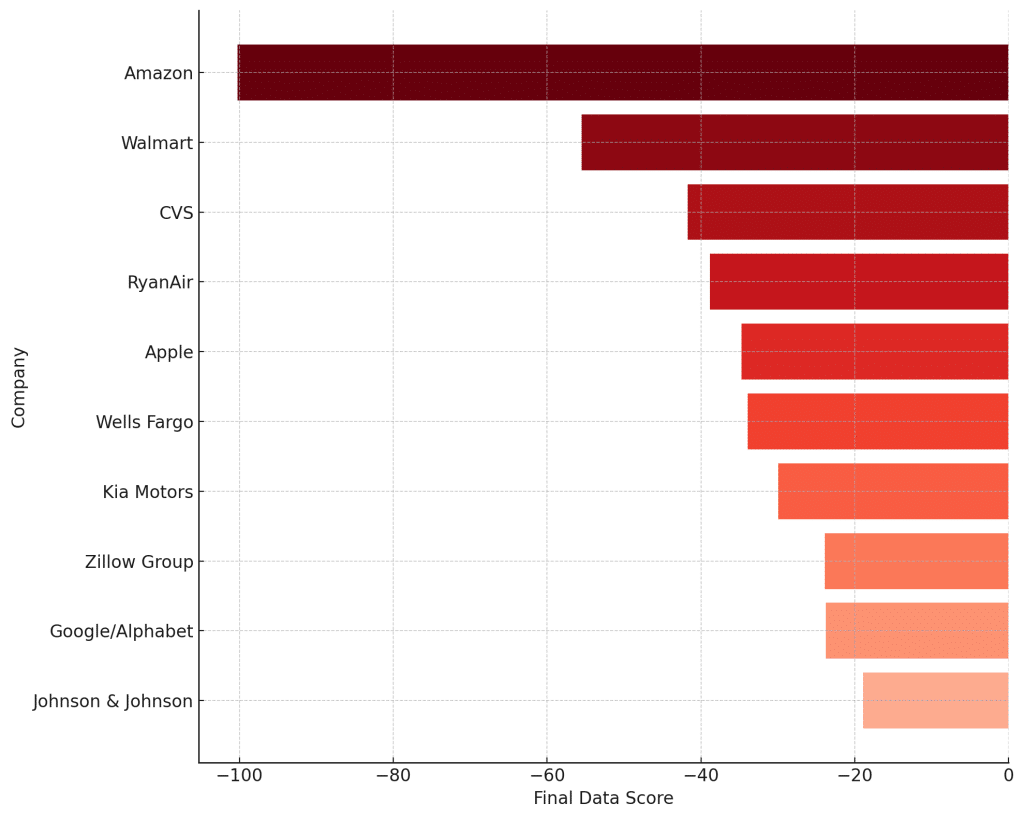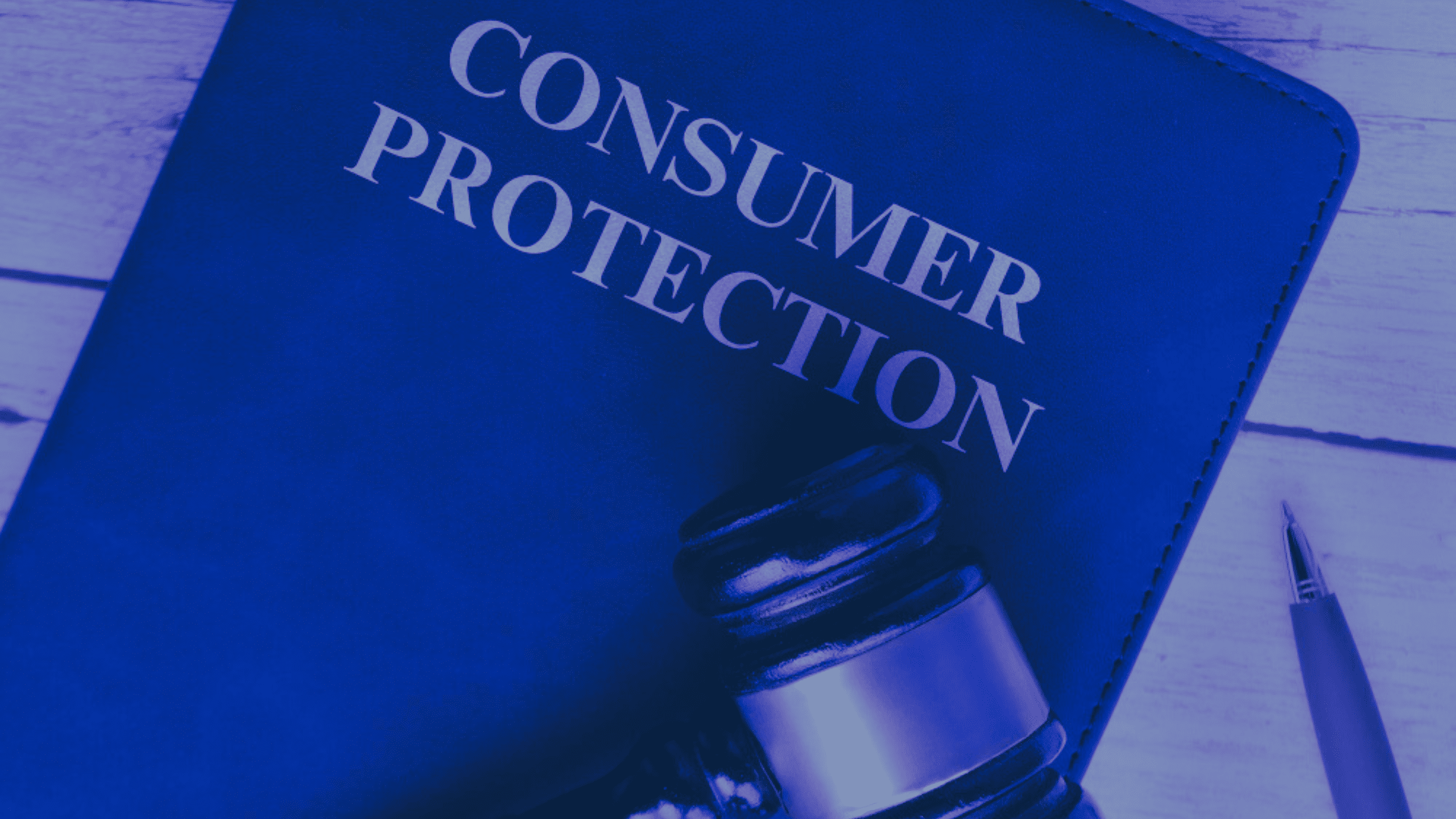At Permutable AI, we are pleased to announce our latest analysis on consumer protection sentiment, highlighting companies perceived as falling short in protecting consumer rights across the globe. The analysis, leveraging cutting-edge AI and sentiment analysis, analyzes vast amounts of data from various sources to gauge public and market opinions on corporate consumer protection practices. This analysis is crucial for businesses navigating the modern landscape, where consumer trust is paramount for building brand trust, loyalty and achieving sustainable success.
The analysis encompassed a diverse range of industries, including e-commerce, retail, pharmaceuticals, airlines, and technology. Companies with the most negative sentiment scores concerning consumer protection include:
|
Company |
Industry |
Final data score |
|
|
1. |
E-commerce |
– 100.27 |
|
|
2. |
Retail |
– 55.53 |
|
|
3. |
CVS |
Retail/Pharmaceuticals |
– 41.7 |
|
4. |
Ryanair |
Airlines |
– 38.83 |
|
5. |
Tech |
– 34.71 |
|
|
6. |
Banking |
– 33.9 |
|
|
7. |
Kia Motors |
Automotive |
– 29.96 |
|
8. |
Zillow Group |
Real Estate |
– 23.89 |
|
9. |
Internet |
– 23.8 |
|
|
10. |
Pharmaceuticals/Consumer Health |
– 18.91 |
Table of Contents
ToggleConsumer protection rankings: Key highlights
Each company listed in the report is accompanied by specific concerns identified within the data:
Amazon: Concerns about counterfeit products being sold on Amazon and allegations of manipulating search results to favour their own products have eroded trust with some consumers.
Walmart: Walmart has been involved in numerous product recalls due to safety concerns as well as being accused of misleading customers with false advertising, “rollback” pricing that may not reflect actual savings, and price discrimination based on location.
CVS: The pharmacy chain has been criticised for its complex pricing structure and its handling of customer data, raising concerns about transparency and privacy.
Ryanair: The airline is known for its aggressive cost-cutting measures, which often translate to poor customer service and hidden fees, leading to frustration and dissatisfaction among travelers.
Apple: The tech giant has been criticised for its restrictive repair policies that make it difficult and expensive for consumers to repair their own devices, and for practices like planned obsolescence, where Apple products are designed to become obsolete quickly, encouraging frequent upgrades.
Wells Fargo: The bank has been working to regain trust after a massive scandal involving fraudulent accounts opened by employees without customer consent. In 2022, Wells Fargo was fined for mismanaging loans and accounts, including misapplied payments and wrongful repossessions.
Kia Motors: The automaker has faced safety recalls for some of its vehicles and concerns about the warranty coverage offered to customers, raising questions about Kia Motors‘ commitment to consumer safety.
Zillow Group: The online real estate marketplace Zillow has been under scrutiny for the accuracy of its valuations and its data use practices, leading to concerns about reliability and potential ethical violations.
Google/Alphabet: The tech giant operating under the umbrella of Alphabet continues to face challenges related to data privacy and potential bias in its search algorithms, requiring ongoing efforts to demonstrate transparency and fairness in its practices to its users.
Johnson & Johnson: The pharmaceutical company has been involved in several high-profile legal challenges related to the safety of its products, which has significantly damaged Johnson & Johnson‘s brand image and requires significant effort to regain consumer trust.

Consumer trust: A business imperative
These findings emphasise the critical role of consumer protection in building brand integrity and trust. In a competitive marketplace, trust is a key differentiator that drives consumer choice and navigates crises effectively. Ultimately, prioritising consumer protection translates into long-term business success and a competitive advantage.
We believe that these companies should be focusing on improving transparency in their operations, especially in areas like product safety, privacy, and data handling. Strengthening customer service, addressing ethical concerns promptly, and ensuring clear, fair pricing and advertising practices are essential. Additionally, implementing robust systems for feedback and grievances can help in quickly addressing consumer issues, improving trust and loyalty. Adopting a consumer-first approach in policy-making and operational strategies will not only mitigate reputation risks but also foster a positive brand image, contributing to long-term success and sustainability in today’s increasingly aware and ethically focused market.
Wilson Chan, CEO of Permutable AI, commented: “This analysis highlights the importance of consumer protection in maintaining brand trust. Companies must actively address these concerns to foster positive relationships with their consumers. At Permutable AI, we are committed to leveraging AI to shed light on these critical issues, helping to encourage businesses towards more ethical, transparent and ultimate and more consumer-friendly practices.”
Talya Stone, CMO at Permutable AI highlighted: “In today’s digital era, the essence of consumer trust has never been more critical. Our findings not only spotlight the imperative of consumer protection but also serve as a call to action for businesses to realign their practices with the evolving expectations of society. As we navigate through the complexities of consumer sentiment, let us remember that at the heart of every transaction lies the foundational pillar of trust.”
Methodology
- Permutable AI’s methodology ensures a comprehensive and accurate representation of market sentiment by analyzing 500,000 articles daily and incorporating companies with a minimum market capitalization of £10 million.
- A sentiment score ranging from -100 to 100 is assigned to each company based on a nuanced analysis of positive and negative mentions in media coverage.
Permutable AI encourages a continuous dialogue around consumer protection and hopes this analysis will inspire companies to embrace more sustainable and ethical practices. By highlighting these issues, we aim to contribute to a marketplace characterised by transparency, informed decision-making, and ethical conduct.
Find out more
Interested in diving deeper into our consumer protection sentiment analysis? Our findings reveal significant areas of concern across industries from e-commerce to technology, highlighting companies that have room to improve in building consumer trust—a key to sustainable success. If you’re a company keen on understanding the specifics behind these insights, we invite you to get in touch. Discover how you can address consumer protection more effectively and enhance your brand integrity. Email us at enquiries@permutable.ai or fill in the form below.
